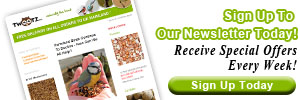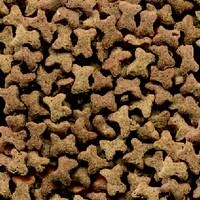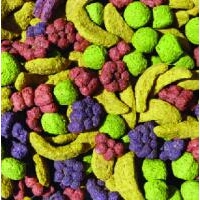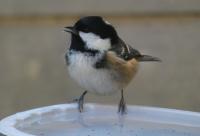- Home
- Special Offers
- New Products
- FAQs
- Customer Video Gallery
- Customer Photo Gallery
- Bird Facts
- Bird Food Blog
- Bird Information
- Feeding Advice
- Small Animal Information
- A to Z of Guinea Pigs
- A to Z of Hamsters
- A to Z of Rabbits
- Basic Care for Guinea Pigs
- Basic Care for Hamsters
- Basic Care for Rabbits
- Basic care for Chinchillas
- Basic care for Ferrets
- Basic care for Gerbils
- Basic care for Mice
- Basic care for Rats
- Buying a Healthy Small Animal
- Does your Reptile need a Licence
- Equipment for Ferrets
- Equipment for Hamsters
- Equipment for Mice
- Equipment for your Chinchilla
- Equipment for your Gerbil
- Equipment for your Guinea Pig
- Equipment for your Rabbit
- Keeping a House Rabbit
- Dog Information
- Cat Information
- Customer Information
- Bird Food
- Small Animals Food
- Pond Fish Food
- Dog Food
- Cat Food
- My Account
| Tweet |

|
Basic care for Ferrets
Want a pet that’s a bit different from the norm? Then why not consider a ferret? Forget common beliefs to the contrary, ferrets are lively, loving and wonderful fun – providing you are up to the challenge of one owning you!
Twootz provides Premium Ferret Food and Small Animal fruity mix which are both ideal for your Ferrets well being.
Employed since Roman times to hunt rabbits and endowed with the unfair reputation of being ferocious and smelly, ferrets may seem unlikely animals to choose as pets. However, they are gradually becoming more popular in this role as they exhibit similar personalities to dogs and cats, being easy to train and possessing affectionate and gentle natures when cared for and handled correctly.
It is true that they can emit a powerful pong if alarmed or scared, but if you look after your ferret properly he will smell no more than any other pet. Just like a skunk (also of the weasel-type family) who considers himself in danger, a ferret employs his personal and highly effective defence system by releasing a foul-smelling scent from his anal glands. This is the reason ferrets gained a reputation for being malodorous. However, as their care and handling when used in their primary role as working animals was not usually conducive to creating calm, unstressed ferrets, it was not surprising they retaliated by biting their handlers and making a stink!
Fact: A male ferret is called a hob, a female is a jill and babies are kits. Vasectomised, a male is a hobblet; a hobble if he’s castrated.
Tip: Handle your ferret gently and avoid startling or frightening him to reduce the risk of him emitting a nasty niff!
Housing and bedding
Ferrets live happily on their own or as a pair, but remember that keep costs increase the more you own. Hobs and jills are equally affectionate, so either sex is suitable as a pet.
If you opt for a pair, then two females from the same litter would be the ideal choice as two hobs can inflict serious injuries upon each other once sexual maturity is reached – even if they are siblings. Mixed sexes of neutered ferrets can be kept together with few/no problems.
Two ferrets kept together provide company and amusement for each other, whereas one will depend on you much more for mental and social satisfaction.
Ferrets can be kept either indoors or outdoors, but an increasing amount of owners opt for the former and allow their ‘house hunters’ freedom to roam inside under supervision. Although an indoor environment is non-traditional it is becoming the norm, with owners discovering that this method allows for more interaction between person and pet which in turn leads to a more affectionate ferret and mutually rewarding relationship.
If you do decide to keep your ferret indoors, provide him with a suitably sized, solid floor cage; for one ferret the minimum recommended size is 62 x 62 x 45cm (24 x 24 x 18 inches), but the bigger the better for comfort and exercise purposes. An indoor aviary (large enclosure for housing birds) is ideal if your budget will stretch to it.
If kept outside, you will need to ensure that your ferret's cage is weather- and escape-proof and the same size as for indoor housing applies. Although wooden hutches can be difficult to keep scrupulously clean and pong-proof, they do offer better insulation and ventilation than metal and synthetic material in all types of weather. For extra exercise and play space, attach a run to the hutch – but ensure it is escape-proof!
Tip: Aquariums are unsuitable as ferret homes.
As regards bedding, untreated softwood shavings have long been considered ideal material for lining your ferret's cage as they are relatively cheap and widely available from pet stores.
Avoid sawdust as this may irritate the ferrets’ eyes and cause respiratory problems due to its phenol (aromatic compound) and high dust content. Other preferred cage linings include unprinted sheet paper and cotton material such as towels or sheets (wash regularly); use unprinted paper (sheet or shredded), hay, straw or cotton material for your nesting-box bedding.
Naturally clean animals, ferrets will often use one area usually a corner of their cage as a toilet. Alternatively place a litter tray containing odour-neutralising cat litter in your ferret’s cage – he’ll soon twig what it’s for! Do not put food or water dishes near the toilet area.
Remove heavily soiled patches daily and replace with fresh litter. Change the bedding weekly, or more often if necessary, before washing the cage using a pet disinfectant. Allow the cage to dry before furnishing with fresh, clean bedding.
Tip: Avoid wooden ferret hutches for indoor use; not only are they heavy, they are difficult to keep clean and free from odours. Plump for practical plastic!
Tip: When buying a cage or hutch, ensure that the opening is conveniently placed and is wide enough for you to get your ferret/bedding/food in and out.
Grooming
Although ferrets do not need to be groomed regularly to maintain coat condition (they are clean creatures and take pride in their personal appearance), it is a good idea to do so for several reasons: grooming him will help create a close relationship between you and your ferret; while grooming you can check your pet over for injuries and signs of ill-health; loose hairs can be collected and disposed of instead of ending up decorating the carpet.
When grooming your ferret, use a soft-bristled brush plus a small metal comb. Always brush with the lay of the coat, ie in the direction the hairs grow, not against, or you’ll create discomfort and one cross ferret!
Ask your vet to show you how to trim your pet’s nails if they grow too long.
Tip: Regular bathing is unnecessary and does not remove body odours.
Feeding
As with all animals, ferrets need a well-balanced diet to remain healthy. Providing this is made easy for the novice owner thanks to specially formulated complete ferret foods that are available from pet shops. Choose from dry, semi-moist or moist varieties – whichever your ferret likes and thrives on best. If fed on moist food, supply your ferret with a beef bone and/or hard wholemeal dog biscuit (such as a Bonio) your ferret will enjoy chewing on and playing with both and they will help keep his teeth clean and in good condition.
Use a heavy ceramic dish to prevent your ferret from tipping out the contents and wash it out daily to remove stale food and keep it fresh. A gravity water bottle is better than a bowl, as it stops your pet from slopping water all over his cage.
Twootz provides Premium Ferret Food and Small Animal fruity mix which are both ideal for your Ferrets well being.
Tip: Maintain regular feed times to keep your ferret’s digestive system in good working order. A lack of routine may result in stomach upsets and mental stress. Ideally, ferrets should be fed little and often.
Exercise
Ferrets love to play and will often chase their owners to encourage them to join in. However, if not handled properly or allowed to get away with biting as a youngster, ferrets can become quite rough whilst playing, often using their teeth to grab hold of their playmate. While a playful nip from a kit doesn’t tend to hurt much, one from an adult will!
A ferret’s basic instinct is to pursue prey (such as rabbits, rats and mice), so they enjoy chasing after small solid rubber or golf balls and mauling purpose-made ferret toys. They love to play and relax in hammocks, while tubes and tunnels also prove irresistible to ferrets – they adore running through and hiding in them.
Ferrets can be taught to wear a harness and walk on a lead but ensure that your ferret’s harness fits snugly as these animals can wriggle through the smallest of spaces!
Tip: Daily mental and physical exercise is essential in maintaining ferret health.
Tip: Pet ferrets are better suited to older children (aged eight plus) and adults due to their boisterous nature and dental defence line if handled roughly! It’s safer not to allow small children to handle them.
Health
A healthy ferret will be inquisitive, good-tempered and playful with a good appetite, shiny coat, clean ears, eyes, nose and anus. He should move easily and display no hint of lameness.
Learn to recognise what daily activity, appetite and behaviour is normal for your pet so that any signs of distress or ill-health will be instantly apparent to you.
Adopt the habit of checking your ferret every day for illness or injury and consult your vet if there is anything untoward that you are worried about.
Ferrets are susceptible to canine distemper a horrible disease that often proves fatal so it is a wise precaution to have your pet vaccinated against this. Ask your vet for details.
On reaching sexual maturity, jills are prone to oestrogen-induced anaemia. If the jill is not mated, the levels of oestrogen in her body will rise which can cause bone marrow depression and anaemia. In early stages, neutering can be effective.
Ferrets require worming and de-fleaing on a regular basis to keep them parasite-free. Your vet will provide details of what products to use and how to use them on request.
Twootz provides Premium Ferret Food and Small Animal fruity mix which are both ideal for your Ferrets well being.
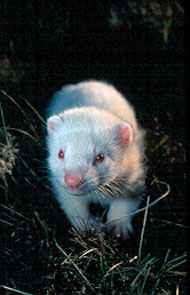
Employed since Roman times to hunt rabbits and endowed with the unfair reputation of being ferocious and smelly, ferrets may seem unlikely animals to choose as pets. However, they are gradually becoming more popular in this role as they exhibit similar personalities to dogs and cats, being easy to train and possessing affectionate and gentle natures when cared for and handled correctly.
It is true that they can emit a powerful pong if alarmed or scared, but if you look after your ferret properly he will smell no more than any other pet. Just like a skunk (also of the weasel-type family) who considers himself in danger, a ferret employs his personal and highly effective defence system by releasing a foul-smelling scent from his anal glands. This is the reason ferrets gained a reputation for being malodorous. However, as their care and handling when used in their primary role as working animals was not usually conducive to creating calm, unstressed ferrets, it was not surprising they retaliated by biting their handlers and making a stink!
Fact: A male ferret is called a hob, a female is a jill and babies are kits. Vasectomised, a male is a hobblet; a hobble if he’s castrated.
Tip: Handle your ferret gently and avoid startling or frightening him to reduce the risk of him emitting a nasty niff!
Housing and bedding
Ferrets live happily on their own or as a pair, but remember that keep costs increase the more you own. Hobs and jills are equally affectionate, so either sex is suitable as a pet.
If you opt for a pair, then two females from the same litter would be the ideal choice as two hobs can inflict serious injuries upon each other once sexual maturity is reached – even if they are siblings. Mixed sexes of neutered ferrets can be kept together with few/no problems.
Two ferrets kept together provide company and amusement for each other, whereas one will depend on you much more for mental and social satisfaction.
Ferrets can be kept either indoors or outdoors, but an increasing amount of owners opt for the former and allow their ‘house hunters’ freedom to roam inside under supervision. Although an indoor environment is non-traditional it is becoming the norm, with owners discovering that this method allows for more interaction between person and pet which in turn leads to a more affectionate ferret and mutually rewarding relationship.
If you do decide to keep your ferret indoors, provide him with a suitably sized, solid floor cage; for one ferret the minimum recommended size is 62 x 62 x 45cm (24 x 24 x 18 inches), but the bigger the better for comfort and exercise purposes. An indoor aviary (large enclosure for housing birds) is ideal if your budget will stretch to it.
If kept outside, you will need to ensure that your ferret's cage is weather- and escape-proof and the same size as for indoor housing applies. Although wooden hutches can be difficult to keep scrupulously clean and pong-proof, they do offer better insulation and ventilation than metal and synthetic material in all types of weather. For extra exercise and play space, attach a run to the hutch – but ensure it is escape-proof!
Tip: Aquariums are unsuitable as ferret homes.
As regards bedding, untreated softwood shavings have long been considered ideal material for lining your ferret's cage as they are relatively cheap and widely available from pet stores.
Avoid sawdust as this may irritate the ferrets’ eyes and cause respiratory problems due to its phenol (aromatic compound) and high dust content. Other preferred cage linings include unprinted sheet paper and cotton material such as towels or sheets (wash regularly); use unprinted paper (sheet or shredded), hay, straw or cotton material for your nesting-box bedding.
Naturally clean animals, ferrets will often use one area usually a corner of their cage as a toilet. Alternatively place a litter tray containing odour-neutralising cat litter in your ferret’s cage – he’ll soon twig what it’s for! Do not put food or water dishes near the toilet area.
Remove heavily soiled patches daily and replace with fresh litter. Change the bedding weekly, or more often if necessary, before washing the cage using a pet disinfectant. Allow the cage to dry before furnishing with fresh, clean bedding.
Tip: Avoid wooden ferret hutches for indoor use; not only are they heavy, they are difficult to keep clean and free from odours. Plump for practical plastic!
Tip: When buying a cage or hutch, ensure that the opening is conveniently placed and is wide enough for you to get your ferret/bedding/food in and out.
Grooming
Although ferrets do not need to be groomed regularly to maintain coat condition (they are clean creatures and take pride in their personal appearance), it is a good idea to do so for several reasons: grooming him will help create a close relationship between you and your ferret; while grooming you can check your pet over for injuries and signs of ill-health; loose hairs can be collected and disposed of instead of ending up decorating the carpet.
When grooming your ferret, use a soft-bristled brush plus a small metal comb. Always brush with the lay of the coat, ie in the direction the hairs grow, not against, or you’ll create discomfort and one cross ferret!
Ask your vet to show you how to trim your pet’s nails if they grow too long.
Tip: Regular bathing is unnecessary and does not remove body odours.
Feeding
As with all animals, ferrets need a well-balanced diet to remain healthy. Providing this is made easy for the novice owner thanks to specially formulated complete ferret foods that are available from pet shops. Choose from dry, semi-moist or moist varieties – whichever your ferret likes and thrives on best. If fed on moist food, supply your ferret with a beef bone and/or hard wholemeal dog biscuit (such as a Bonio) your ferret will enjoy chewing on and playing with both and they will help keep his teeth clean and in good condition.
Use a heavy ceramic dish to prevent your ferret from tipping out the contents and wash it out daily to remove stale food and keep it fresh. A gravity water bottle is better than a bowl, as it stops your pet from slopping water all over his cage.
Twootz provides Premium Ferret Food and Small Animal fruity mix which are both ideal for your Ferrets well being.
Tip: Maintain regular feed times to keep your ferret’s digestive system in good working order. A lack of routine may result in stomach upsets and mental stress. Ideally, ferrets should be fed little and often.
Exercise
Ferrets love to play and will often chase their owners to encourage them to join in. However, if not handled properly or allowed to get away with biting as a youngster, ferrets can become quite rough whilst playing, often using their teeth to grab hold of their playmate. While a playful nip from a kit doesn’t tend to hurt much, one from an adult will!
A ferret’s basic instinct is to pursue prey (such as rabbits, rats and mice), so they enjoy chasing after small solid rubber or golf balls and mauling purpose-made ferret toys. They love to play and relax in hammocks, while tubes and tunnels also prove irresistible to ferrets – they adore running through and hiding in them.
Ferrets can be taught to wear a harness and walk on a lead but ensure that your ferret’s harness fits snugly as these animals can wriggle through the smallest of spaces!
Tip: Daily mental and physical exercise is essential in maintaining ferret health.
Tip: Pet ferrets are better suited to older children (aged eight plus) and adults due to their boisterous nature and dental defence line if handled roughly! It’s safer not to allow small children to handle them.
Health
A healthy ferret will be inquisitive, good-tempered and playful with a good appetite, shiny coat, clean ears, eyes, nose and anus. He should move easily and display no hint of lameness.
Learn to recognise what daily activity, appetite and behaviour is normal for your pet so that any signs of distress or ill-health will be instantly apparent to you.
Adopt the habit of checking your ferret every day for illness or injury and consult your vet if there is anything untoward that you are worried about.
Ferrets are susceptible to canine distemper a horrible disease that often proves fatal so it is a wise precaution to have your pet vaccinated against this. Ask your vet for details.
On reaching sexual maturity, jills are prone to oestrogen-induced anaemia. If the jill is not mated, the levels of oestrogen in her body will rise which can cause bone marrow depression and anaemia. In early stages, neutering can be effective.
Ferrets require worming and de-fleaing on a regular basis to keep them parasite-free. Your vet will provide details of what products to use and how to use them on request.


